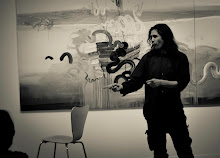Standing on the Brink...
One of the things I love philosophy for, one of the things that really keeps me coming back to it, is its ability to say the unexpected, and argue convincingly the apparently perverse. It is a discipline adept in turning the oddball into radical thought. And yet this move is so difficult. It is easy to become a mere curmudgeon or contrarian. That is, an individual, who for all their own opinions, remains caught by the discussions of their times, and so fated to be caught by their implicit maxims and preconceptions. It is so very easy you see for debate to become the thing in itself - the arena in which we strike attitudes, become a people and a power - and so stop being what surely every discussion ought to be (if it can) - namely a genuine attempt to look at, and perhaps to understand how we are already caught by movements and powers, that lie beyond and inbetween us all.
In short, for me philosophy should, if it can, confront what is hard to talk about, and if cannot it should at least proceed in the light of the 'unthought'. If it does not, then the heart surely drops out of it, and it becomes merely a 'discussion' topic, a register of opinions and 'arguments' past and present: a set, or collection of legal cases and precedents. Even more problematically, its thinkers risk always becoming mere heroes of thought - the Men who taught us all this or that, popular thought or partial prejudice. Names become then attributed to simplified arguments and routinised dilemmas, which are to be presented as if they were philosophy - and as if they were what actually thinking was about.
The 'Argument-as-philosophy' credo has for me a double disadvantage. Firstly it loses sight of actually what you are doing when you are thinking. We are simply lying about what thought involves, by presenting it always as fait accompli (a standard teaching strategy). But even more importantly, in this rush for argument, we are doing thought a disservice, and making it feel more alien than it is. Real thinking, starts (and ends) with that quiet confrontation with 'that which lies between or beyond us', which we are (occasionally) caught up in. Thought starts the moment a world I thought I knew begins to feel feel 'uncanny' and tricky. A moment that demands not a sophisticated argument, so much as an openness to what is other than ourselves.
It is the communication of this last point, that for me forms the bedrock to the stand up philosophy performances, and what makes it different from so much academic philosophy. If you are teaching the subject you need to explain the argument, and summarise a formula and move on - but if you are performing it, you are free to stay with the dilemma, and to explore its passion and power.
Hence, again speaking personally, stand up philosophy, lies very close to Kierkegaard, in its intent and ethic. It exists as the paradoxical attempt to communicate something irresolvable in words, or formulae, and yet palpable and highly accessible for all, for all of that: - For it is the very power, the very urgency to think. All of which (perhaps) explains why, of all the pieces I perform regularly this is the one I find myself returning to, and watching again and again - for I think is says something about what I feel I am trying to do in genuinely performing thought.


No comments:
Post a Comment